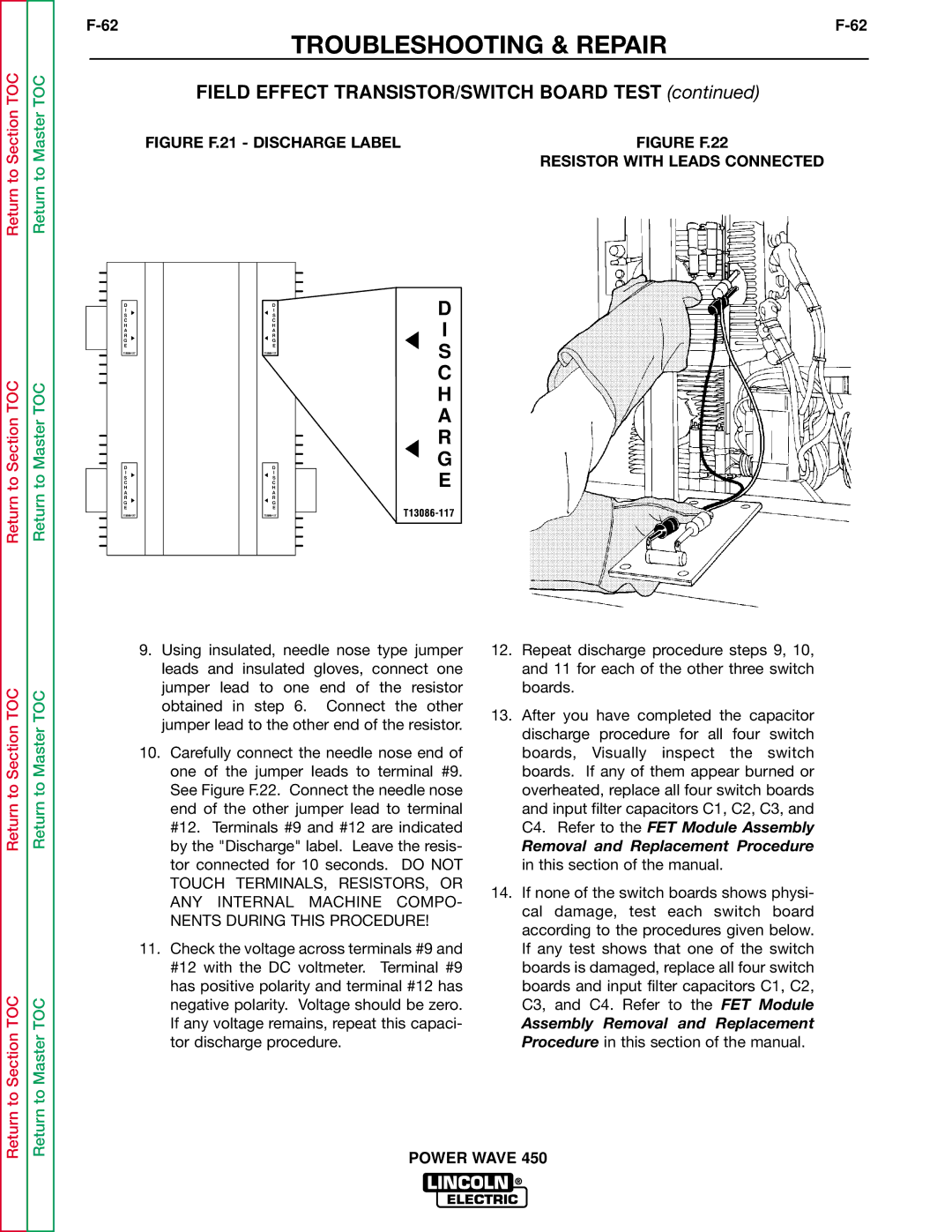
Return to Section TOC
Return to Section TOC
Return to Master TOC
Return to Master TOC
TROUBLESHOOTING & REPAIR
FIELD EFFECT TRANSISTOR/SWITCH BOARD TEST (continued)
FIGURE F.21 - DISCHARGE LABEL | FIGURE F.22 |
| RESISTOR WITH LEADS CONNECTED |
|
|
|
|
|
|
|
|
|
|
|
|
|
|
|
|
|
|
|
|
|
|
|
|
|
|
|
|
|
|
|
|
|
|
|
|
|
|
|
|
|
|
|
|
|
|
|
|
|
|
|
|
|
|
|
|
|
|
| D |
|
|
| S |
|
|
|
|
| S |
|
|
|
| |
|
|
| D |
|
|
|
|
| D |
|
|
|
|
|
|
|
| I |
|
|
|
|
| I |
|
|
|
|
|
|
|
| C |
|
|
|
|
| C |
|
|
|
| I |
|
|
| R |
|
|
|
|
| R |
|
|
|
| |
|
|
| H |
|
|
|
|
| H |
|
|
|
|
|
|
|
| A |
|
|
|
|
| A |
|
|
|
|
|
|
|
| G |
|
|
|
|
| G |
|
|
|
| S |
|
|
| E |
|
|
|
|
| E |
|
|
|
| |
|
|
|
|
|
|
|
|
|
|
|
|
|
| |
|
|
|
|
|
|
|
|
|
|
|
|
|
| |
|
|
|
|
|
|
|
|
|
|
|
|
|
| C |
|
|
|
|
|
|
|
|
|
|
|
| |||
|
|
|
|
|
|
|
|
|
|
|
|
|
| H |
|
|
|
|
|
|
|
|
|
|
|
|
|
| A |
|
|
|
|
|
|
|
|
|
|
|
|
|
| R |
|
|
|
|
|
|
|
|
|
|
|
| |||
|
|
|
|
|
|
|
|
|
|
|
|
|
| G |
|
|
|
|
|
|
|
|
|
|
|
| |||
|
|
| D |
|
|
|
|
| D |
|
|
|
| |
|
|
| I |
|
|
|
|
| I |
|
|
|
| E |
|
|
| H |
|
|
|
|
| H |
|
|
|
| |
|
|
| S |
|
|
|
|
| S |
|
|
|
|
|
|
|
| C |
|
|
|
|
| C |
|
|
|
|
|
|
|
| A |
|
|
|
|
| A |
|
|
|
|
|
|
|
| R |
|
|
|
|
| R |
|
|
|
|
|
|
|
| G |
|
|
|
|
| G |
|
|
|
|
|
|
|
| E |
|
|
|
|
| E |
|
|
|
|
|
|
|
|
|
|
|
|
|
|
|
|
|
|
|
|
|
|
|
|
|
|
|
|
|
|
|
|
|
|
|
|
|
|
|
|
|
|
|
|
|
|
|
|
|
|
|
|
|
|
|
|
|
|
|
|
|
|
|
|
|
|
|
|
|
|
|
|
|
|
|
|
|
|
|
|
|
|
|
|
|
|
|
|
|
|
|
|
|
|
|
Return to Section TOC
Return to Section TOC
Return to Master TOC
Return to Master TOC
9.Using insulated, needle nose type jumper leads and insulated gloves, connect one jumper lead to one end of the resistor obtained in step 6. Connect the other jumper lead to the other end of the resistor.
10.Carefully connect the needle nose end of one of the jumper leads to terminal #9. See Figure F.22. Connect the needle nose end of the other jumper lead to terminal #12. Terminals #9 and #12 are indicated by the "Discharge" label. Leave the resis- tor connected for 10 seconds. DO NOT TOUCH TERMINALS, RESISTORS, OR ANY INTERNAL MACHINE COMPO- NENTS DURING THIS PROCEDURE!
11.Check the voltage across terminals #9 and #12 with the DC voltmeter. Terminal #9 has positive polarity and terminal #12 has negative polarity. Voltage should be zero. If any voltage remains, repeat this capaci- tor discharge procedure.
12.Repeat discharge procedure steps 9, 10, and 11 for each of the other three switch boards.
13.After you have completed the capacitor discharge procedure for all four switch boards, Visually inspect the switch boards. If any of them appear burned or overheated, replace all four switch boards and input filter capacitors C1, C2, C3, and C4. Refer to the FET Module Assembly
Removal and Replacement Procedure in this section of the manual.
14.If none of the switch boards shows physi- cal damage, test each switch board according to the procedures given below. If any test shows that one of the switch boards is damaged, replace all four switch boards and input filter capacitors C1, C2, C3, and C4. Refer to the FET Module
Assembly Removal and Replacement Procedure in this section of the manual.
